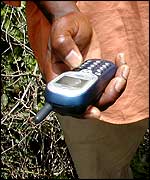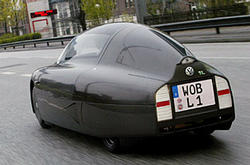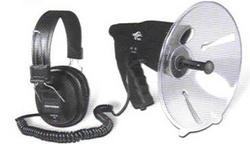| Monday, January 6, 2003 |  |
|
|
|
Slashdot:"ZDNet is running a story on what a lot of us already know: Linux IS cheaper than Windows. This not because it is free. It is because Linux admins, although slightly more expensive, can handle a significantly larger number of systems than their Windows counterparts."
I can attest to that. The most horrible job (to me) I've had, after supermarket checkout clerk, was to administer two Windows NT servers. Because what is really going on is usually a proprietary mystery, and you'll waste a lot of time on hold with Microsoft, or pulling your hair out and rebooting the machine. And, on the other side, I've had the job of single-handedly administering around 150 Linux servers, and I was quite content with that.
[ Technology | 2003-01-06 11:36 | | PermaLink ] More >
|
|
| Thursday, January 2, 2003 |  |
|
|
|
 Paul Hughes has a vision: Paul Hughes has a vision:
"Imagine this. It's the year 2010, and almost everyone has a real-time always-on connection to the Net via ubiquitous wearable 'augmented reality' devices. As part of this package, made possible with advance minuturized heads-up displays, video cameras, location aware devices, GPS, swarmbots, emotion-sensitive and adaptive algorithms (i.e. Affective Computing), and sophisticated reputation systems, you are able to surf an augmented version of reality itself in real time.
Lets break this down. You would be able to, in real-time see precisely whats going on anywhere in the globe by jacking in to the collection of real-time video blogs. As part of this collection, sophisticated 3-D rendering engines would be able to take the collective video footage and extropolate a real-time VR scene, allowing you to transcend the viewing angle of any single camera. Better still, you could jack in to that part of the world from a variety of, not only physical perspectives, but political, intellectual, and emotional as well based on whatever any individual user makes public as part their unique sliding-scale trust system such as the type that Joi Ito has proposed with moblogs. All of this meta-data would form its own collective smart-mob based on individually selected criteria.
What this means is that you could then view the "scene" from virtually any angle. Imagine the possibility here. Some spontaneous news event occurs, and almost instantly as hundreds of people appear on the scene with wearable video cameras broadcasting on the net, you would be able to view this real-time scene from any angle, while simultaneously gaining the collective emotional assesment of the situation from those people choosing to broadcast their emotional indices, as well as the blogging that will invariable start occuring at rapid pace from your customized reputation/trust criteria.
All of this combines to gives you a real-time augmented, yet customized view of real-time reality. One that is rich in social and emotional context, providing and extending intimacy by empowering you to feel and touch the whole world." Yes, it's cool, I want it badly. It is nice to sit and write with people all over the world, but really I want to BE in those places. Hang out, look around, soak up the atmosphere. And I'm tired of people instantly lining up and putting on fake smiles when I pull out a camera. I want the real stuff, so I'd much rather have an always-on camera in my glasses.
[ Technology | 2003-01-02 03:56 | | PermaLink ] More >
|
|
| Tuesday, December 31, 2002 |  |
|
|
|
 Here's an idea for a useful gadget or application: You walk around the supermarket and you see a product or a brand you might consider buying. Before you do so, you enter it into your little handheld wireless device. Maybe even by scanning the barcode. It then looks up information about that company and/or product on the net, organized to be from sources you trust in that regard. So, not simply a google search and certainly not the company's own website, but the inside scoop from people with no vested interest in faking it. It gives you a quick snapshot about who owns the company, what they're doing in the world that is good or bad, what the product actually is about, and how other people have liked it. Instant consumer guide investigatory report. The technology is not hard, as it is just about there. It is more in the packaging of it. A wireless PDA or cellphone with a simple web browser. Small barcode readers are available, but it should be integrated. Aside from that, the trick is mainly in putting the knowledgebase together in a way that can be trusted, and providing an interface that makes it a 5 second no-brainer thing to do as routine. Of course you want to know that the company in question employs child slave labor and that they've patented Basmati rice, and that previous customers liked the alternatives better. And you'd want to know what those ingredients really mean, right there on the spot. Such a device could change the world overnight. Even if you aren't an activist eco-freak, it would inevitably change your choices. Here's an idea for a useful gadget or application: You walk around the supermarket and you see a product or a brand you might consider buying. Before you do so, you enter it into your little handheld wireless device. Maybe even by scanning the barcode. It then looks up information about that company and/or product on the net, organized to be from sources you trust in that regard. So, not simply a google search and certainly not the company's own website, but the inside scoop from people with no vested interest in faking it. It gives you a quick snapshot about who owns the company, what they're doing in the world that is good or bad, what the product actually is about, and how other people have liked it. Instant consumer guide investigatory report. The technology is not hard, as it is just about there. It is more in the packaging of it. A wireless PDA or cellphone with a simple web browser. Small barcode readers are available, but it should be integrated. Aside from that, the trick is mainly in putting the knowledgebase together in a way that can be trusted, and providing an interface that makes it a 5 second no-brainer thing to do as routine. Of course you want to know that the company in question employs child slave labor and that they've patented Basmati rice, and that previous customers liked the alternatives better. And you'd want to know what those ingredients really mean, right there on the spot. Such a device could change the world overnight. Even if you aren't an activist eco-freak, it would inevitably change your choices.
 ...[later in the day] Ah, Seb Paquet mentions CueJack is doing something very much pointed in that direction. It uses the cheap CueCat barcode reader. I remember getting one for free attached to a copy of Wired, but I think I threw it away because I didn't know what to do with it at the time, as its proposed use (looking up a company's website while you were reading a magazine) sounded stupid. DigitalConvergence that made them has gone under. But there is now apparently an open source database of UPC (the system used in barcodes). CueJack will look up in that, and will do a search engine search on 'boycott', 'corporate abuse', 'profits' and that kind of thing in relation to the product. Cool, those are big steps in the right direction. But, I'd want housewives to be able to have it in their purse, and preferably something more direct than searching in search engines. ...[later in the day] Ah, Seb Paquet mentions CueJack is doing something very much pointed in that direction. It uses the cheap CueCat barcode reader. I remember getting one for free attached to a copy of Wired, but I think I threw it away because I didn't know what to do with it at the time, as its proposed use (looking up a company's website while you were reading a magazine) sounded stupid. DigitalConvergence that made them has gone under. But there is now apparently an open source database of UPC (the system used in barcodes). CueJack will look up in that, and will do a search engine search on 'boycott', 'corporate abuse', 'profits' and that kind of thing in relation to the product. Cool, those are big steps in the right direction. But, I'd want housewives to be able to have it in their purse, and preferably something more direct than searching in search engines.
And then Paul Hughes has a piece on very similar ideas about "Participatory Capitalism":"I think as wireless, wearable internet access become ubiquitous, we are going to see consumer power re-assert itself in an unprecedented way. Imagine for example, CueCat (a technology previously with little purpose), except this time each barcode is cross-referenced with a moblog not only neatly containing everyones opinion of this product, but also its ethical/corruption index. These types of measurements would be made via decentralized ad-hoc smart mobs in conjunction with individual reputation systems. So, not only will you be able to vote with your pocketbook, but you will be able to make informed, even ethical consumer decsions based on people you trust. I can see this web-of-trust rapidly superceding top-heavy "consumer" capitalism, transforming it into a bottom-up grass-roots participatory capitalism."
[ Technology | 2002-12-31 03:39 | | PermaLink ] More >
|
|
| Friday, December 20, 2002 |  |
|
|
|
The Bush administration apparently has a plan for building a centralized system to enable broad monitoring of the Internet, and, potentially, surveillance of its users, through arrangements with ISPs. The proposal is part of a final version of a report, 'The National Strategy to Secure Cyberspace', set for release early next year.Mitch Ratcliffe says, and I agree: "This is sheer idiocy, because it will actually increase the risks to the national information infrastructure. From its inception, the Net was conceived as a distributed system that could reorganize around failures (in the case of the original designs, the Net was built to route around damage caused by nuclear weapons). Centralizing all network communications to facilitate surveillance will create a huge, ripe and easily attacked target, reducing the reliability and performance of the Internet on the whole and for each individual user. Likewise, the plan would invade the digital borders of other countries, creating many conflicts that don't impede communication today." Well, if it happens, we'll have to route around that particular damage. The U.S. could no longer be allowed to contain the central hubs of the Internet, and we'll just have to encrypt more traffic. ... Note: the next day the White House issued a clarification, saying the plan is not finished and it will not necessarily include monitoring of individual e-mail. Yeah, sure.
[ Technology | 2002-12-20 15:02 | | PermaLink ] More >
|
|
| Wednesday, December 11, 2002 |  |
|
|
|
 According to BBC, web browsing on mobile phones is working out great for farmers and small vendors in Senegal, who can look up valuable market information. According to BBC, web browsing on mobile phones is working out great for farmers and small vendors in Senegal, who can look up valuable market information. Browsing web pages using a mobile phone may not be very popular in Europe, but it is catching on among canny market traders in Senegal.
The snappily-named Wireless Application Protocol was launched to much fanfare in Europe over two years ago. But has not won many fans, despite the fact that most handsets can use it.
But Senegalese market traders are proving that the technology does have its uses thanks to a project run by Manobi, a joint venture run by French and Senegalese entrepreneurs.
Manobi uses teams to gather information about the prices of foods and goods being sold in the markets in and around Dakar.
[ Technology | 2002-12-11 23:59 | | PermaLink ] More >
|
|
| Monday, December 9, 2002 |  |
|
|
|
 ScienceaGoGo reports on a discovery in materials for solar cells. It is sort of technical, but in brief the discovery is that an alloy of indium gallium nitride can convert pretty much the full spectrum of our sunlight, from the near infrared to the far ultraviolet, into electrical current. If they succeed in making practical solar cells of the material, they promise to be rugged, inexpensive, and more efficient than anything seen before. ScienceaGoGo reports on a discovery in materials for solar cells. It is sort of technical, but in brief the discovery is that an alloy of indium gallium nitride can convert pretty much the full spectrum of our sunlight, from the near infrared to the far ultraviolet, into electrical current. If they succeed in making practical solar cells of the material, they promise to be rugged, inexpensive, and more efficient than anything seen before.
[ Technology | 2002-12-09 17:04 | | PermaLink ] More >
|
|
| Monday, December 2, 2002 |  |
|
|
|
 Slashdot reports: "VW/Audi has a history of being a leader in creating super fuel efficient vehicles. They currently sell the most fuel efficient car in the world, 3L Lupo and the Audi A2, and the most fuel efficient station wagon (Jetta TDI Wagon). Now VW is experimenting with something along the lines of the Honda Insight ( a 2 person vehicle ). The 1L VW concept car can achieve .89L/100kms or 239MPG. With Biodiesel and Ultra low sulfur diesel becoming available, hopefully more of these vehicles will come to North America. These fuels are already available in Europe and combined with the new catalyst technology they use, these new engines produce very low emissions." Slashdot reports: "VW/Audi has a history of being a leader in creating super fuel efficient vehicles. They currently sell the most fuel efficient car in the world, 3L Lupo and the Audi A2, and the most fuel efficient station wagon (Jetta TDI Wagon). Now VW is experimenting with something along the lines of the Honda Insight ( a 2 person vehicle ). The 1L VW concept car can achieve .89L/100kms or 239MPG. With Biodiesel and Ultra low sulfur diesel becoming available, hopefully more of these vehicles will come to North America. These fuels are already available in Europe and combined with the new catalyst technology they use, these new engines produce very low emissions."
[ Technology | 2002-12-02 02:56 | | PermaLink ] More >
|
|
| Sunday, December 1, 2002 |  |
|
|
|
Robert X. Cringely has excellent advice for the music, film and print industries. His column is always well researched and argued. Here he has some excellent analogies about how monopolies fight change, in part by pretending to deliver what people want, but doing it really poorly."My favorite historical example of this phenomenon comes from the oil business. In the 1920s, the Anglo-Persian Oil Company had a monopoly on oil production in the Middle East, which they generally protected through the use of diplomatic -- and occasionally military -- force against the local monarchies. Then the Gulf Oil Company of Pittsburgh, Pennsylvania, literally sneaked into Kuwait and obtained from the Al-Sabah family (who still run the place) a license to search for oil. The Anglo-Persian Oil Company did not like Gulf's actions, but they were even more dismayed to learn that Gulf couldn't be told to just go to hell. Andrew Mellon, of the Pittsburgh Mellons, was the U.S. Secretary of the Treasury, and he wasn't about to let his oil company be pushed around by the British Foreign Office. So Anglo-Persian and the Foreign Office did their best to delay Gulf, which worked for several years. They lied a little, lost a few maps, failed to read a telegram or two, and when Gulf still didn't go away, they turned to acting stupid. As the absolute regional experts on oil exploration, they offered to do Gulf's job, to save the Americans the bother of searching for oil in Kuwait by searching for them. The Anglo-Persian Oil Company searched for oil in Kuwait for 22 years without finding a single drop." So, likewise, the music or movie companies are likely to come up with their own peer-to-peer solutions for media distribution. They will be expensive and they won't work very well, but they might slow their own demise.
[ Technology | 2002-12-01 20:53 | | PermaLink ] More >
|
|
|
|
 David Reed says in The Sky's No Longer the Limit that there is essentially no longer any reason to regard radio spectrum as limited. Lots of policies and procedures around the use of radio waves are based on the fundamental assumption that it is a very limited resource, and that governments need to assign different frequencies for specific different purposes. Or, worse, they sell part of the spectrum for huge sums to private enterprises. Anyway, the result is that most of it is unused, and that a few very popular uses of it (cellphones and wireless networking) have too little to work with. There are technologies, such as software-defined radio or UltraWideBand, that could use the spectrum in much more flexible ways. Reeds is very optimistic, and he is somebody worth listening to. David Reed says in The Sky's No Longer the Limit that there is essentially no longer any reason to regard radio spectrum as limited. Lots of policies and procedures around the use of radio waves are based on the fundamental assumption that it is a very limited resource, and that governments need to assign different frequencies for specific different purposes. Or, worse, they sell part of the spectrum for huge sums to private enterprises. Anyway, the result is that most of it is unused, and that a few very popular uses of it (cellphones and wireless networking) have too little to work with. There are technologies, such as software-defined radio or UltraWideBand, that could use the spectrum in much more flexible ways. Reeds is very optimistic, and he is somebody worth listening to.
[ Technology | 2002-12-01 19:41 | 0 comments | PermaLink ]
|
|
| Thursday, November 21, 2002 |  |
|
|
|
 A Forbes article talks about the interesting possibilities in having sensors everywhere. You know, tiny little devices that power themeselves from solar or kinetic energy, and that are wirelessly networked data gathering points. There are a lot of problems in the world that can be avoided if there is a sensor watching for it. Polution, structural failures, traffic, crime, weather. The problem, of course, is that there are also power hungry governments who'd love to point these things at you and I, to catch us in doing something they don't like. A Forbes article talks about the interesting possibilities in having sensors everywhere. You know, tiny little devices that power themeselves from solar or kinetic energy, and that are wirelessly networked data gathering points. There are a lot of problems in the world that can be avoided if there is a sensor watching for it. Polution, structural failures, traffic, crime, weather. The problem, of course, is that there are also power hungry governments who'd love to point these things at you and I, to catch us in doing something they don't like.
[ Technology | 2002-11-21 21:58 | 0 comments | PermaLink ]
|
|
|
|
 MyLifeBits is a project where engineers are trying to develop a way of storing all of your life in a database. Well, it sounds like a piece of vaporware, and they're mainly talking about just storing all your photos, all your videos and all your letters in one place. What I'd really like is *everything*, automatically recorded and neatly indexed and searchable. Of course there are few searches I'd rather not do, like "my most embarrassing moments", but there's a lot of useful stuff I'd like to remember more effortlessly without having to go around thinking about it. Anyway, curiously, the idea of storing your life in an infinite digital storage place, and the idea of hypertext, was proposed in the 40s by Vannevar Bush, George W's grandfather, who was a visionary electrical engineer who ended up running a lot of America's black projects at the time, first being part of the atomic bomb project, and later being a member of Majestic12. MyLifeBits is a project where engineers are trying to develop a way of storing all of your life in a database. Well, it sounds like a piece of vaporware, and they're mainly talking about just storing all your photos, all your videos and all your letters in one place. What I'd really like is *everything*, automatically recorded and neatly indexed and searchable. Of course there are few searches I'd rather not do, like "my most embarrassing moments", but there's a lot of useful stuff I'd like to remember more effortlessly without having to go around thinking about it. Anyway, curiously, the idea of storing your life in an infinite digital storage place, and the idea of hypertext, was proposed in the 40s by Vannevar Bush, George W's grandfather, who was a visionary electrical engineer who ended up running a lot of America's black projects at the time, first being part of the atomic bomb project, and later being a member of Majestic12.
[ Technology | 2002-11-21 17:09 | | PermaLink ] More >
|
|
| Thursday, November 14, 2002 |  |
|
|
|
 A tiny battery developed by researchers at Cornell will provide power continuously for decades. It is only a cubic millimeter. Imagine never having to charge your cellphone or your laptop computer. Only problem is that ..eh .. it is radioactive. A tiny battery developed by researchers at Cornell will provide power continuously for decades. It is only a cubic millimeter. Imagine never having to charge your cellphone or your laptop computer. Only problem is that ..eh .. it is radioactive.
[ Technology | 2002-11-14 23:59 | | PermaLink ] More >
|
|
|
|
 Rocky Mountain Institute argues that it is no longer economical to generate electricity in large centralized plants, because the distribution grid is more costly than the plants. Rocky Mountain Institute argues that it is no longer economical to generate electricity in large centralized plants, because the distribution grid is more costly than the plants.
"In today's electricity market, however, the economies of scale that justified building big coal-fired and nuclear power plants have been outrun by diseconomies of scale, both in the grid and in generating plants. Mass production of smaller generating units offers greater economies than big plants can gain through unit size. Centralized power generation is no longer cheaper even on its own—and when supply is expanded, new power plants now cost less than the grid linking them to customers."
[ Technology | 2002-11-14 23:59 | | PermaLink ] More >
|
|
| Thursday, November 7, 2002 |  |
|
|
|
 Scott Lemon mentions how he wired up the motel we were staying at for our futurist outing in Utah a couple of weeks ago. Scott is really into wearable computers and wireless connections and stuff like that. Scott Lemon mentions how he wired up the motel we were staying at for our futurist outing in Utah a couple of weeks ago. Scott is really into wearable computers and wireless connections and stuff like that.
[ Technology | 2002-11-07 23:54 | 0 comments | PermaLink ] More >
|
|
|
|
 I love my most recent digital camera. The first I had was an Olympus which used up the non-rechargable batteries as fast as you could fill up its 20 picture memory. The second one, Sony DSC-30 is still great. Lots of room with memory sticks, and the rechargable batteries last several hours. But it is too big to just put in your pocket, unless you're specifically going out to take pictures. So that's the point of the latest one. This is a Casio Exilim EX-M2. It is the size of a credit card, but thicker, and it is stainless steel, so you can just about put it in your back pocket and forget about it. And also, it does what none of the other cameras did - it takes the picture almost instantly. Most digital cameras take so long to take the picture that the people you were pointing at have moved on. Oh, and it records short videos too, and audio at any length, and it plays MP3 files. A big reason I got this camera was that Ray Ozzie recommended it in his blog. A recommendation from somebody you trust is worth much more than any ad. I love my most recent digital camera. The first I had was an Olympus which used up the non-rechargable batteries as fast as you could fill up its 20 picture memory. The second one, Sony DSC-30 is still great. Lots of room with memory sticks, and the rechargable batteries last several hours. But it is too big to just put in your pocket, unless you're specifically going out to take pictures. So that's the point of the latest one. This is a Casio Exilim EX-M2. It is the size of a credit card, but thicker, and it is stainless steel, so you can just about put it in your back pocket and forget about it. And also, it does what none of the other cameras did - it takes the picture almost instantly. Most digital cameras take so long to take the picture that the people you were pointing at have moved on. Oh, and it records short videos too, and audio at any length, and it plays MP3 files. A big reason I got this camera was that Ray Ozzie recommended it in his blog. A recommendation from somebody you trust is worth much more than any ad.
[ Technology | 2002-11-07 23:32 | | PermaLink ] More >
|
|
|
|
 Dave Winer says: "Kevin Werbach is at a meeting with lots of bigshot media execs in NY and reports that they love to talk about TiVO as a threat, or a competitive factor or something they want to sue out of business. One thing they never get about TiVO is the profoundness of the feature that skips backwards and lets you replay a snippet. I've come to want that feature in every audio and video device I own from the car radio to the walkman, my iPod (amazingly it doesn't have it), and even with people I'm talking with, both in person and on the phone. "You said that in an interesting way, now what exactly did you say?" Listen the same way I read. And would you tell them for me that I do this with their friggin commercials too -- when they're interesting or especially depraved. Maybe they'll get the clue that it's time to stop programming us with their commercials and start educating and entertaining." Dave Winer says: "Kevin Werbach is at a meeting with lots of bigshot media execs in NY and reports that they love to talk about TiVO as a threat, or a competitive factor or something they want to sue out of business. One thing they never get about TiVO is the profoundness of the feature that skips backwards and lets you replay a snippet. I've come to want that feature in every audio and video device I own from the car radio to the walkman, my iPod (amazingly it doesn't have it), and even with people I'm talking with, both in person and on the phone. "You said that in an interesting way, now what exactly did you say?" Listen the same way I read. And would you tell them for me that I do this with their friggin commercials too -- when they're interesting or especially depraved. Maybe they'll get the clue that it's time to stop programming us with their commercials and start educating and entertaining."
[ Technology | 2002-11-07 02:00 | | PermaLink ] More >
|
|
<< Newer stories Page: 1 2 3 4 5 6 |

